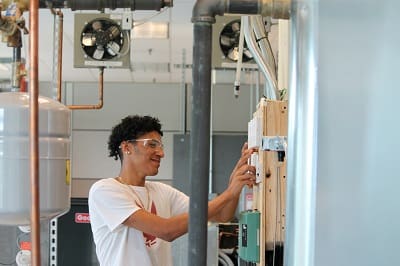
Is HVAC Hard on Your Body?
HVAC (HVACR – Heating, Ventilation, Air Conditioning, and Refrigeration) is a hands-on skilled trade that involves fixing, installing and maintaining various heating, cooling, and ventilation equipment. For those who like the idea of working with their hands, career training in HVAC may be the right path for you.
Skilled HVAC Technicians often work with their hands out in the field, and there may be physical demands involved in HVAC which can be a part of a technician’s daily life. HVAC technicians can often spend their time bending, crouched, or lean on their knees as they install and work on different types of equipment. For this reason, it’s important for a technician to listen to their body and make adjustments when necessary to avoid fatigue.
HVAC may also involve some lifting or moving heavy equipment. It is not uncommon for technicians to have to transport large equipment like air conditioning units or furnaces for installation. Even when equipment is available to assist in moving these pieces, there can be some physical demand required. HVAC Technicians may also use a wide range of tools which will need to be carried along for use when on the job.
Helping to Ease the Physical Demands of HVAC
As an HVAC school in New England, we are aware that technicians generally want to avoid strain on their body so they can remain comfortable and continue to help their customers. There are some things that you can do to help. As a school that offers HVAC courses, we feel it is beneficial to share some tips to people thinking about joining the field so they may be aware of the physical strain of HVAC.
We recommend:
- Technicians stretch their body before and after work. This helps to warm the body up and promotes circulation and blood flow across your body.
- Lift with legs and knees, not your back.
- Lay padding under knees or wear special kneepads even if only required to kneel for a short project. Softening the surface may help discomfort in joints such as knees or elbows.
- Use proper tools like a moving dolly, or roller to transport heavy equipment.
- Take breaks before beginning to feel pain. Give the body time to rest after exertion, and definitely take a break if pain begins.
- See a doctor for any chronic pain or if an injury has occured.
If you are ready to find out more about the HVAC career training program, contact NETTTS today.



